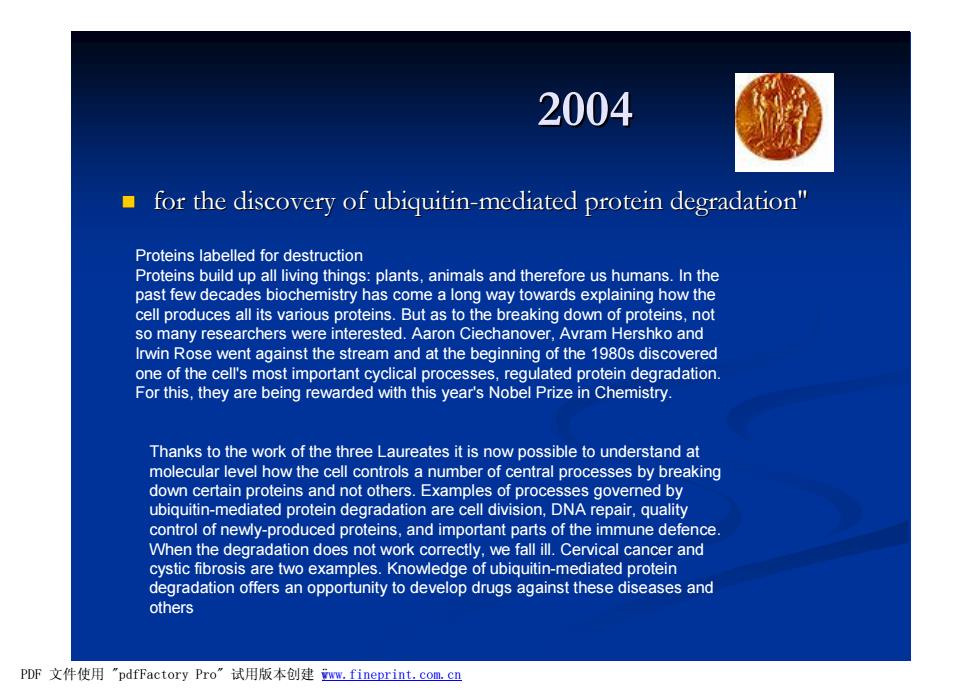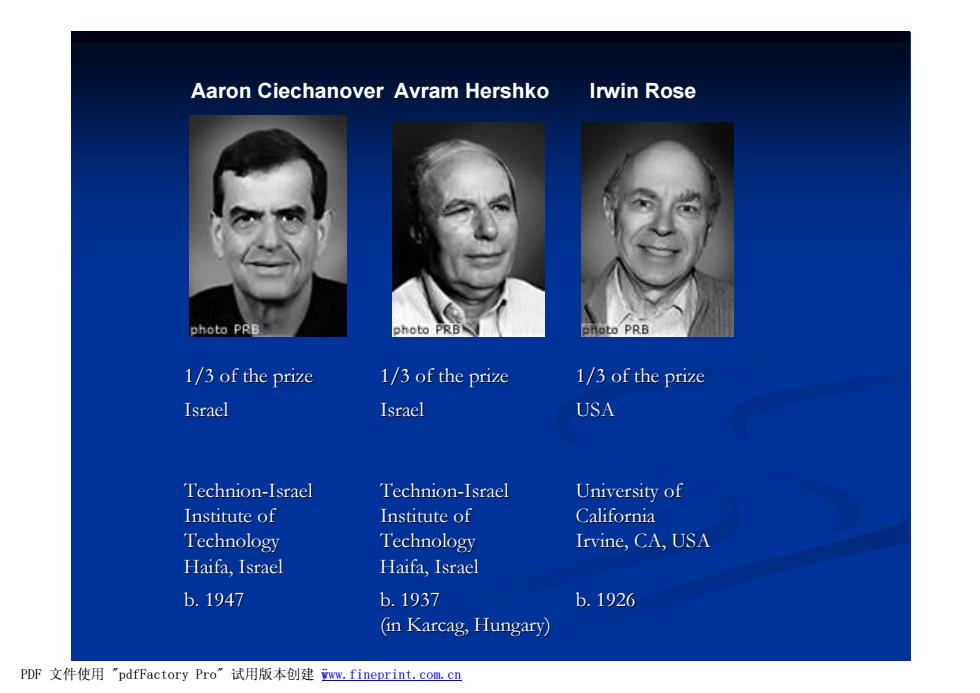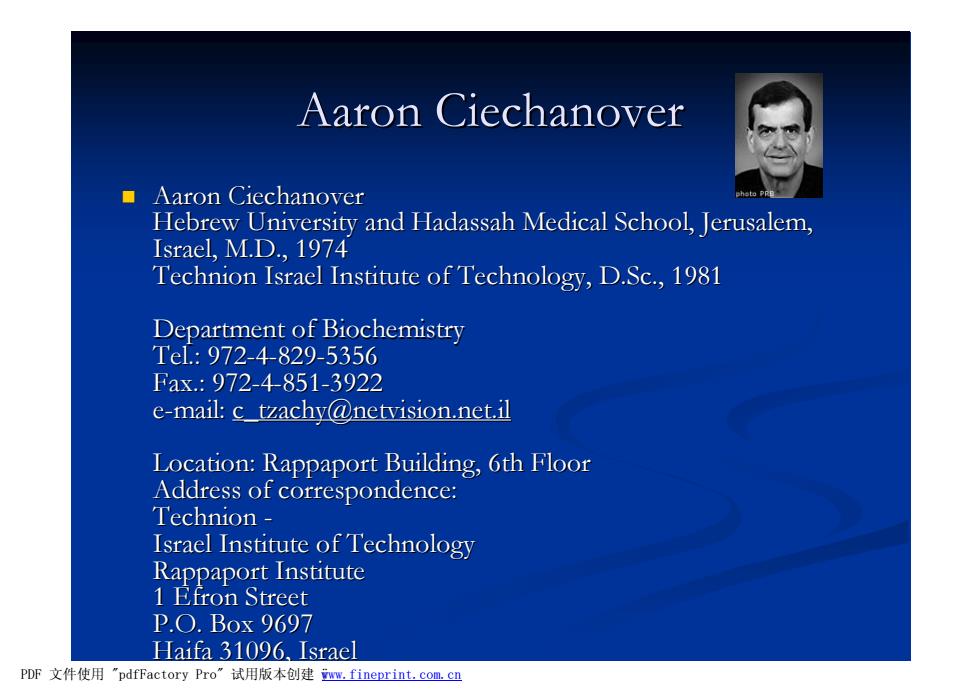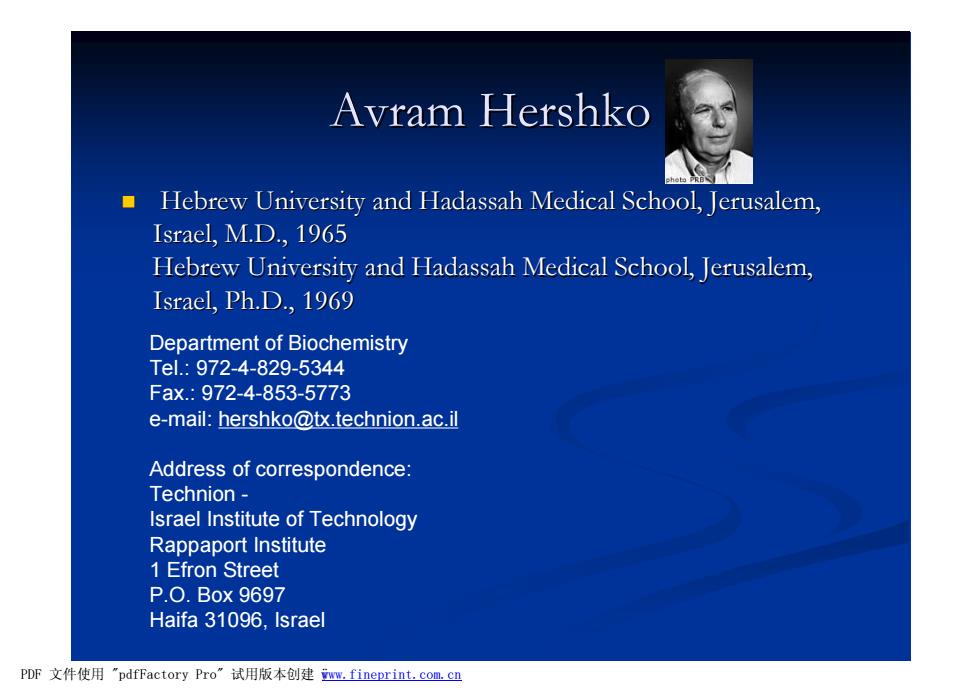
Peter Agre born 1949 (54 years)in Northfield,Minnesota (US citizen).Medical Doctor 1974 at Johns Hopkins University School of Medicine,Baltimore,USA Professor of Biological Chemistry and Professor of Medicine at Johns Hopkins University School of Medicine,Baltimore,USA Born in Northfield,Minn.,in 1949,Agre went to Theodore Roosevelt High School in Minneapolis,and in 1970 earned his bachelor's degree in chemistry from Augsburg College in that city.He received his medical doctorate from Johns Hopkins in 1974.In 1981,after post-graduate medical training and then a fellowship at the University of North Carolina at Chapel Hill,Agre returned to Hopkins,where he progressed through the ranks of the departments of medicine and cell biology.In 1993,he was recruited by then-department director Daniel Lane,Ph.D.,to become a professor in the department of biological chemistry,a position he still holds. Agre was elected to membership in the National Academy of Sciences in 2000 and to the American Academy of Arts and Sciences in 2003.He holds two U.S. patents on the isolation,cloning and expression of aquaporins 1 and 5 and is the principal investigator on four current National Institutes of Health grants. It has been 25 years since a current Hopkins School of Medicine faculty member was awarded a Nobel Prize.In 1978,scientists Hamilton Smith and Daniel Nathans shared the prize with Werner Arber for development and application of restriction enzymes--molecular scissors that cut DNA in predictable places PDF文件使用"pdfFactory Pro”试用版本创建ww,fineprint.com.cn
Peter Agre n born 1949 (54 years) in Northfield, Minnesota (US citizen). Medical Doctor 1974 at Johns Hopkins University School of Medicine, Baltimore, USA. Professor of Biological Chemistry and Professor of Medicine at Johns Hopkins University School of Medicine, Baltimore, USA Born in Northfield, Minn., in 1949, Agre went to Theodore Roosevelt High School in Minneapolis, and in 1970 earned his bachelor's degree in chemistry from Augsburg College in that city. He received his medical doctorate from Johns Hopkins in 1974. In 1981, after post-graduate medical training and then a fellowship at the University of North Carolina at Chapel Hill, Agre returned to Hopkins, where he progressed through the ranks of the departments of medicine and cell biology. In 1993, he was recruited by then-department director Daniel Lane, Ph.D., to become a professor in the department of biological chemistry, a position he still holds. Agre was elected to membership in the National Academy of Sciences in 2000 and to the American Academy of Arts and Sciences in 2003. He holds two U.S. patents on the isolation, cloning and expression of aquaporins 1 and 5 and is the principal investigator on four current National Institutes of Health grants. It has been 25 years since a current Hopkins School of Medicine faculty member was awarded a Nobel Prize. In 1978, scientists Hamilton Smith and Daniel Nathans shared the prize with Werner Arber for development and application of restriction enzymes -- molecular scissors that cut DNA in predictable places PDF 文件使用 "pdfFactory Pro" 试用版本创建 ÿwww.fineprint.com.cn

2004 for the discovery of ubiquitin-mediated protein degradation" Proteins labelled for destruction Proteins build up all living things:plants,animals and therefore us humans.In the past few decades biochemistry has come a long way towards explaining how the cell produces all its various proteins.But as to the breaking down of proteins,not so many researchers were interested.Aaron Ciechanover,Avram Hershko and Irwin Rose went against the stream and at the beginning of the 1980s discovered one of the cell's most important cyclical processes,regulated protein degradation. For this,they are being rewarded with this year's Nobel Prize in Chemistry. Thanks to the work of the three Laureates it is now possible to understand at molecular level how the cell controls a number of central processes by breaking down certain proteins and not others.Examples of processes governed by ubiquitin-mediated protein degradation are cell division,DNA repair,quality control of newly-produced proteins,and important parts of the immune defence When the degradation does not work correctly,we fall ill.Cervical cancer and cystic fibrosis are two examples.Knowledge of ubiquitin-mediated protein degradation offers an opportunity to develop drugs against these diseases and others PDF文件使用"pdfFactory Pro”试用版本创建mw,fineprint..com,cn
2004 n for the discovery of ubiquitin-mediated protein degradation" Proteins labelled for destruction Proteins build up all living things: plants, animals and therefore us humans. In the past few decades biochemistry has come a long way towards explaining how the cell produces all its various proteins. But as to the breaking down of proteins, not so many researchers were interested. Aaron Ciechanover, Avram Hershko and Irwin Rose went against the stream and at the beginning of the 1980s discovered one of the cell's most important cyclical processes, regulated protein degradation. For this, they are being rewarded with this year's Nobel Prize in Chemistry. Thanks to the work of the three Laureates it is now possible to understand at molecular level how the cell controls a number of central processes by breaking down certain proteins and not others. Examples of processes governed by ubiquitin-mediated protein degradation are cell division, DNA repair, quality control of newly-produced proteins, and important parts of the immune defence. When the degradation does not work correctly, we fall ill. Cervical cancer and cystic fibrosis are two examples. Knowledge of ubiquitin-mediated protein degradation offers an opportunity to develop drugs against these diseases and others PDF 文件使用 "pdfFactory Pro" 试用版本创建 ÿwww.fineprint.com.cn

Aaron Ciechanover Avram Hershko Irwin Rose photo PRB photo PRB PRB 1/3 of the prize 1/3 of the prize 1/3 of the prize Israel Israel USA Technion-Israel Technion-Israel University of Institute of Institute of California Technology Technology Irvine,CA,USA Haifa,Israel Haifa,Israel b.1947 b.1937 b.1926 (in Karcag,Hungary) PDF文件使用"pdfFactory Pro”试用版本创建wm,fineprint.com.cn
b. 1937 b. 1926 (in Karcag, Hungary) b. 1947 University of California Irvine, CA, USA Technion-Israel Institute of Technology Haifa, Israel Technion-Israel Institute of Technology Haifa, Israel Israel Israel USA 1/3 of the prize 1/3 of the prize 1/3 of the prize Aaron Ciechanover Avram Hershko Irwin Rose PDF 文件使用 "pdfFactory Pro" 试用版本创建 ÿwww.fineprint.com.cn

Aaron Ciechanover ■aron Ciechanover Hebrew University and Hadassah Medical School,Jerusalem, Israel,M.D.,1974 Technion Israel Institute of Technology,D.Sc.,1981 Department of Biochemistry Tel:972-4829-5356 Fax.:972-4851-3922 e-mail:c tzachy @netvision.net.il Location:Rappaport Building,6th Floor Address of correspondence: Technion Israel Institute of Technology Rappaport Institute 1 Efron Street P.O.Box 9697 Haifa 31096,Israel PDF文件使用"pdfFactory Pro”试用版本创建m,fineprint.com.cn
Aaron Ciechanover n Aaron Ciechanover Hebrew University and Hadassah Medical School, Jerusalem, Israel, M.D., 1974 Technion Israel Institute of Technology, D.Sc., 1981 Department of Biochemistry Tel.: 972-4-829-5356 Fax.: 972-4-851-3922 e-mail: c_tzachy@netvision.net.il Location: Rappaport Building, 6th Floor Address of correspondence: Technion - Israel Institute of Technology Rappaport Institute 1 Efron Street P.O. Box 9697 Haifa 31096, Israel PDF 文件使用 "pdfFactory Pro" 试用版本创建 ÿwww.fineprint.com.cn

Avram Hershko Hebrew University and Hadassah Medical School,Jerusalem, Israel,M.D.,1965 Hebrew University and Hadassah Medical School,Jerusalem, Israel,Ph.D.,1969 Department of Biochemistry Tel.:972-4-829-5344 Fax.:972-4-853-5773 e-mail:hershko@tx.technion.ac.il Address of correspondence: Technion- Israel Institute of Technology Rappaport Institute 1 Efron Street P.O.Box 9697 Haifa 31096,Israel PDF文件使用"pdfFactory Pro”试用版本创建ww,fineprint.com.cn
Avram Hershko n Hebrew University and Hadassah Medical School, Jerusalem, Israel, M.D., 1965 Hebrew University and Hadassah Medical School, Jerusalem, Israel, Ph.D., 1969 Department of Biochemistry Tel.: 972-4-829-5344 Fax.: 972-4-853-5773 e-mail: hershko@tx.technion.ac.il Address of correspondence: Technion - Israel Institute of Technology Rappaport Institute 1 Efron Street P.O. Box 9697 Haifa 31096, Israel PDF 文件使用 "pdfFactory Pro" 试用版本创建 ÿwww.fineprint.com.cn